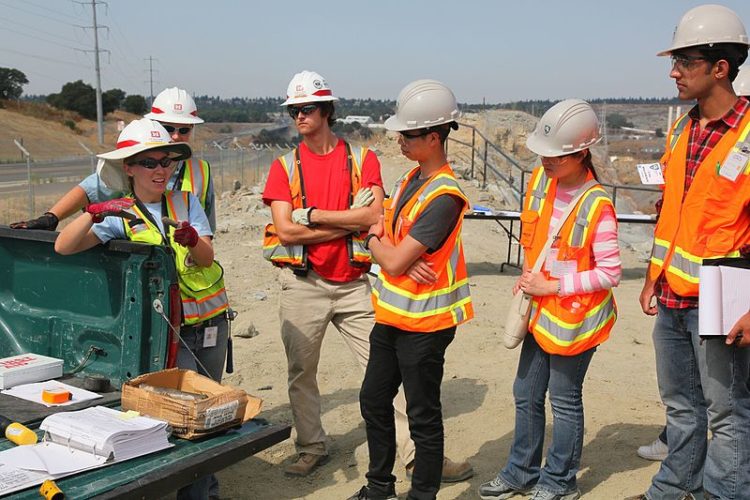We are here to discuss about the factors affecting selection of construction material.

What are the factors affecting site selection?
Before moving ahead with the topic, it is very pertinent for an engineer to have a thorough knowledge about the construction and the material used for the same. Construction means to build something.
Moreover, the word specifically used for the large structures. However, it can be anything. It can be a commercial building, or residential apartments or roads and highways and bridges etc.
What is site selection process?
The construction is incomplete and unfeasible without the proper material used in its making. The basic and fundamental material required for the construction are aggregates(coarse and fine), brick, cement, wood, clay etc. Being an engineer, you should be responsible for the following job made on site:
- Selection of Materials
- Specification of Materials
- Quality control of Materials

How do you choose Materials?
The factors affecting selection of material is divided into following categories:
- on the basis of suitability
- on the basis of economy.

On the Basis of Suitability
Strength:- Strength is an important factor for quality purpose in the construction and the most important selection criteria for construction material.
It shows the ability of a structure to withstand the failure under the action of loads such as compression, tension etc. that can be caused either due to the forces caused by nature or it can also be man-made.
Availability:- It is the another essential factor that should be taken into consideration as it also affect the cost of construction because there are number of materials that need to be transported from other places which will eventually increase the cost of transportation.
Therefore, it is important that the material used is locally available which would save the precious time.
Durability:- It simply means the ability of a structure to bear the load (dead or live), pressure and damage. Therefore, it should be taken proper care of as ultimately the construction should be feasible and durable.
Workability:-Workability simply means handling power. The more is the handling power, the more easily it will place and the concrete can be easily compacted without segregation.
Ease of Transportation:-As it has been already discussed in the previous section of “availability” transportation also plays a vital role. The material to be used should possess great handling power, so that it can be transported easily to the particular place.
Cost:- Cost is another important factor while choosing the material for the construction because ultimately it will lock your choice. The material used should be cost- effective so as to ensure economical structure.
Aesthetics:- Everyone wants to make their construction aesthetically pleasant. For this, the chosen material should be aesthetic, completing and fulfilling all your needs.
Also Read: What is Concrete and its Types
On the Basis of Economy
- Raw Material cost
- Manufacturing cost
- Cost of Transportation
- Cost of Maintenance
Advantages of Choosing Good Material for Construction
Below mentioned advantages of choosing good material for construction:
- Good mixing of coarse and fine aggregates will give more strength and bulk to the concrete.
- Good material will ensure long life of the structure, enhance the workability making it most durable even under the temperature variation.
- Good material when mixed with the asphalt, allows the pavement to bear the vehicle load and environmental condition to its best.
- The maintenance cost will somehow decrease.
Major Components of Materials
Moving further, let’s have a detailed discussion on the major component i.e. mortar and cement concrete.
- Mortar:- This is generally a mixture of cementitious material and the aggregates(should be less than 4mm), water and the necessary additives or adhesives of a good brand. The adhesives are commonly used to bind the material together. Mortar is basically used for the following functions:
- To bind materials together
- To provide aesthetic appearance and smooth finish to the structure.
- To protect against weather
- To serve as a leveling material in brick masonry work.
- To repair the construction i.e damproofing etc.
- Concrete:- It is the mixture of coarse agrregates, fine aggregates, cement and water in a proper proportion. The proportion however depends upon the type of construction. The proportion for residential, commercial, road and highways, bridges etc all are different depending upon the load bearing capacity. For this, the concrete is divided into various no.of grades which are as follows:
| Grade of Concrete | Mix Ratio (cement : sand : aggregate) | Compressive Strength |
| M5 | 1:5:10 | 5 MPa |
| M7.5 | 1:4:8 | 7.5 MPa |
| M10 | 1:3:6 | 10 MPa |
| M15 | 1:2:4 | 15 MPa |
| M20 | 1:1.5:3 | 20 MPa |
| M25 | 1:1:2 | 25 MPa |
| M30 | Design Mix | 30 MPa |
| M35 | Design Mix | 35 MPa |
| M40 | Design Mix | 40 MPa |
| M45 | Design Mix | 45 MPa |
| M50 | Design Mix | 50 MPa |
| M55 | Design Mix | 55 MPa |
| M60 | Design Mix | 60 MPa |
| M65 | Design Mix | 65 MPa |
| M70 | Design Mix | 70 MPa |
Common Types of Cement used in Concreting
The common type of cement used in concreting are as follows:
- Ordinary Portland Cement
- Sulphate Resisting Portland Cement
- Low heat Portland Cement
All the details mentioned above concludes that the material chosen for the construction i.e cement, aggregates, steel etc. should be of the best quality. The best quality ensures maximum workability, better durability, good strength and comes out to be cost effective.
So we should always be choosy while selecting the material as it will be better for the construction and have long term affect.
Also Read: All about the Cement

